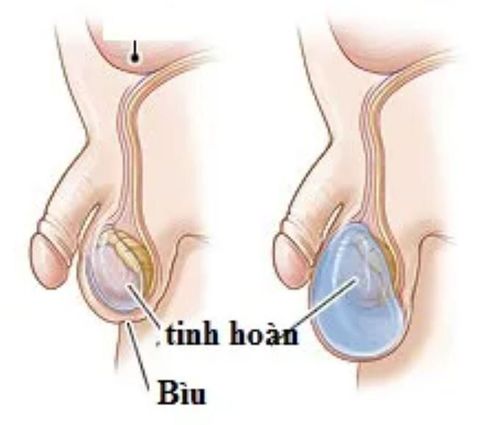This is an automatically translated article.
Children's vitreous disease or vitreous testicle occurs when there is a buildup of fluid in the scrotum. Most cases of vitreous in children will resolve on their own within the first few months of life in infancy so no treatment is needed. If vitreous disease persists as the child grows, a minor surgery can always correct the abnormality.
1. What is vitreous disease in children?
Children's vitreous disease or vitreous testicle is swelling in the scrotum, a thin sac that holds the testicles, that occurs when too much fluid builds up inside. This condition is most common in infants, although it can happen to any male.
As serious or even painful as it sounds, vitreous disease doesn't hurt the baby at all. In the majority of cases, the vitreous in children can go away on its own as the child grows older without any intervention. Even so, parents should still see their doctor for a checkup.
2. What is the cause of vitreous in children?
Vitreous disease may have started before the baby was born. The testicles develop inside the abdomen and then move down the scrotum through a short tunnel. A sac of fluid goes with each testicle. Normally, this tunnel and sac will close before birth and the baby's body will continue to absorb the fluid inside. When this process doesn't go as it should, vitreous testicle condition occurs.
There are two types of vitreous disease:
Cataracts without anastomosis occur when the scrotal sac closes normally but the body cannot absorb the fluid inside the sac. Cataracts with an anastomosis when the child may continue to swell the scrotum more over time.
3. What are the symptoms of vitreous disease?
Cataract disease is completely harmless to the health of the child. The only symptom of this condition that may be noticed is that one or both of your testicles look swollen. Even if a child does not show any pain, parents should see their pediatrician to make sure that the child does not have other health problems causing the same condition, such as an infection, a tumor, or a tumor. inguinal scrotal hernia.
Besides, in non-transparent vitreous disease, the size of the scrotum does not change. On the contrary, vitreous with anastomosis may get larger day by day, or with gentle manipulation, the fluid will move out of the scrotum and into the child's abdomen, so the size will be smaller, but as the fluid moves down, the scrotum size increased.

Tình trạng một túi mỏng giữ tinh hoàn xuất hiện trong bệnh thủy tinh mạc ở trẻ
4. Methods of diagnosis and treatment of vitreous disease in children
When taking your baby to the doctor, the doctor will check the scrotum for fluid and softness in the scrotum, and the doctor will also shine a light through it to see if there is fluid around the testicle.
On the other hand, the doctor will also check to make sure that the baby doesn't have a hernia. In addition, the baby may also have blood tests and an ultrasound of the scrotum to make sure there is no other cause for the swelling, increase in the size of the scrotum.
In most cases, vitreous disease goes away on its own before the child's first birthday. Conversely, if the scrotal sac does not go away or if it is larger, the child needs to see a urologist. Usually, the doctor will recommend surgery without waiting for the disease to go away any more.
During the intervention, the child will be injected with drugs to numb the body or completely. The surgeon then makes an incision in the skin over the scrotum or lower abdomen to drain the fluid and sew the pouch closed. When finished, the child can completely go home the same day.
In the days after vitreous testicle surgery, parents need to keep the area clean and dry and receive instructions on how to care for the wounds until they heal. After a few days, the child should be re-examined to make sure the surgery went well.
5. Possible complications caused by vitreous in children
Vitreous disease is completely harmless to the testicles and does not cause pain for boys if acquired. However, in anastomosis vitreous disease, because the pouch remains open, a loop of bowel can be pushed through the hole creating a hernia. Therefore, if your baby's scrotum suddenly appears painful, hard and increases in size, and your baby doesn't stop crying, call your doctor immediately for early detection and intervention.
Also, in most cases, vitreous disease is not very serious and does not usually affect fertility later in life as an adult. Sometimes, however, the presence of a cyst can facilitate a urinary infection or tumor. These can reduce sperm production or function in the future.
In a nutshell, pediatric vitreous disease or vitreous testicle is when fluid builds up in the thin sac that holds the testicle in the scrotum. It's fairly common, but fortunately, in most cases, vitreous disease goes away without treatment within the first year. However, parents still need to take the child to the right specialist soon if the scrotum changes in size or becomes more painful, the child is fussy to promptly intervene if complications occur.

Tinh hoàn thủy tinh có thể khiến trẻ thấy đau bìu và gặp một số biến chứng
Gathering a team of leading pediatricians: including leading experts with high professional qualifications (professors, associate professors, doctorates, masters), experienced, worked at major hospitals such as Bach Mai, 108.. Doctors All are well-trained, professional, with a mind - range, understanding young psychology. In addition to domestic pediatric specialists, the Department of Pediatrics also has the participation of foreign experts (Japan, Singapore, Australia, USA) who are always pioneers in applying the latest and most effective treatment regimens. . Comprehensive services: In the field of Pediatrics, Vinmec provides a series of continuous medical examination and treatment services from Newborn to Pediatric and Vaccine,... according to international standards to help parents take care of their baby's health from birth to childhood. from birth to adulthood Specialized techniques: Vinmec has successfully deployed many specialized techniques to make the treatment of difficult diseases in Pediatrics more effective: neurosurgery - skull surgery, stem cell transplantation. blood in cancer treatment. Professional care: In addition to understanding children's psychology, Vinmec also pays special attention to the children's play space, helping them to have fun and get used to the hospital's environment, cooperate in treatment, improve the efficiency of medical treatment.
Please dial HOTLINE for more information or register for an appointment HERE. Download MyVinmec app to make appointments faster and to manage your bookings easily.
Reference source: childrenshospital.org













